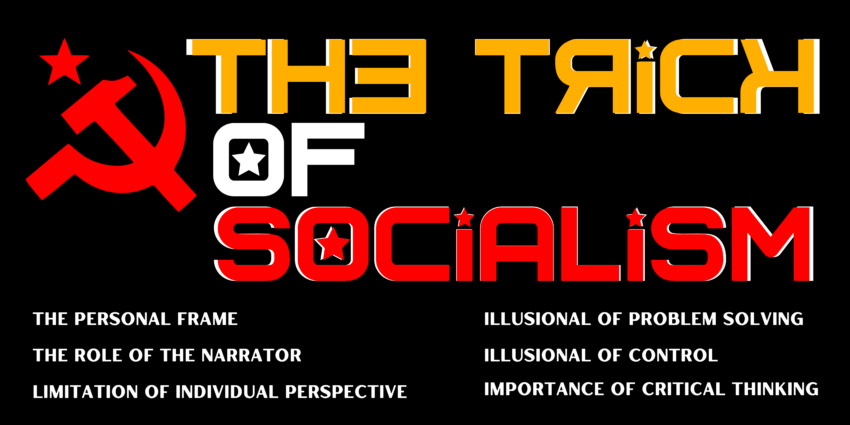Socialism
Why are people falling for the idea of socialism despite how it has failed historically? In this article, we will review the mental tactics and strategies that are used to convince people that socialism is a good idea. How you view socialism is strongly influenced by how the idea is presented to you.
The Personal Frame
You might be surprised to learn how much your own view of socialism depends on how someone presents it to you. Think about it – when someone talks about socialism, they often start by connecting it to your personal struggles. The person sharing these ideas matters too. These “narrators” of socialist thought aren’t just randomly ranting – they’re usually skilled at framing the conversation in a way that guides you toward their perspective. They know exactly how to make their arguments resonate with your everyday experiences and frustrations.
The Role of the Narrator
With a narrator’s role, a storyteller presents a solution that aligns with the individual’s perspective. The narrator avoids responsibility for the flaws in their story but convinces the listener that a utopian resolution exists.
The Narrative Trick: Single-Perspective Framing
- Appealing to Ego and Empathy
- Socialism taps into personal experiences of inequality or perceived injustice.
- It frames these issues as “problems” needing solutions, drawing the individual into their own ego and emotions.
Illusion of Problem Solving
Personal vs. Collective Management
Personal management of private property is clear and actionable (e.g., maintaining a yard).
Collective management requires coordination among diverse perspectives, which socialism downplays.
The Commons Dilemma
Shared resources (like the Boston Common) often lead to conflicts over fair usage. Inequalities in needs (e.g., goats vs. cows) complicate the simplistic solutions socialism offers.
The Illusion of Control
- The Appeal of Simple Solutions: Socialist ideologies often present themselves as simple solutions to complex problems. This appeal is strong for individuals who feel powerless or disillusioned with existing systems.
- The “Us vs. Them” Mentality: By framing the issue as a conflict between the “haves” and the “have-nots,” socialist narratives can foster a sense of collective grievance and a desire for radical change.
- The Illusion of Control: These narratives offer the illusion of control, suggesting that individuals can collectively overcome systemic challenges through collective action.
The Limitations of the Individual Perspective
- The Danger of Generalization: If you rely solely on your individual perspectives, it can lead to oversimplification and generalizations.
- The Importance of Context: It’s crucial to consider the broader context of societal issues, including historical, economic, and cultural factors.
- The Limitations of Personal Experience: Our personal experiences, while valuable, don’t always accurately reflect the complexities of broader societal issues.
How Critical Thinking is Important
- Questioning Narratives: It’s essential to critically examine the narratives presented by proponents of socialist ideologies.
- Considering Alternative Perspectives: Seeking out diverse perspectives and challenging assumptions can help to avoid falling prey to simplistic solutions.
- Recognizing the Limitations of Individual Experience: Acknowledging the limitations of personal experience and the importance of broader context is crucial for informed decision-making.
Conclusion
Socialism’s enduring appeal lies in its ability to frame personal experiences into compelling narratives. By understanding the psychological tricks and limitations of this perspective, individuals can better evaluate its promises and pitfalls. Ultimately, effective governance and societal structures must recognize the complexity of human interaction, resource management, and fairness.
Please check out “The Trick of Socialism” on the Navigation Patterns channel.
Navigating Patterns: The Trick of Socialism
Additional Episodes in the Tools for Sense-Making Series:
Our Views the Dangers of Oversimplifying – Where are we Going Part 1 – Article | YouTube
Critical thinking – if A then what else? – Article | YouTube
Conspiracy theories and their utility – Article | YouTube
Understanding the World – Where we are going? Part 2 – YouTube | Article
Making Sense of the World – Where we are going? Part 3 – YouTube | Article
Where we need to be. Part 4 – Finalizing the model – Article | YouTube
How to Think Better? Models – Part 5 – Article | YouTube
The Trick of Socialism – YouTube
Cognitive Load – How it Works! – Article | YouTube
Understanding the Enchanted World – YouTube


